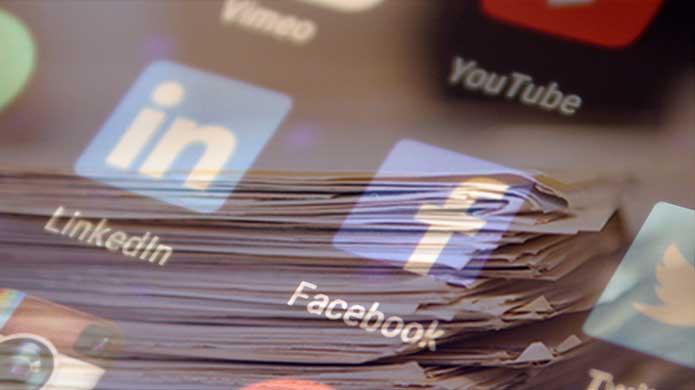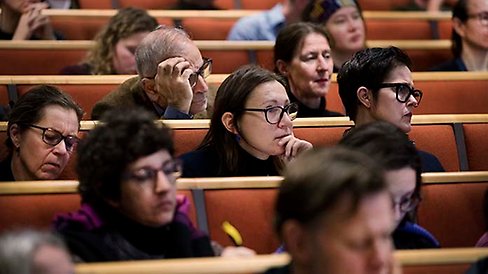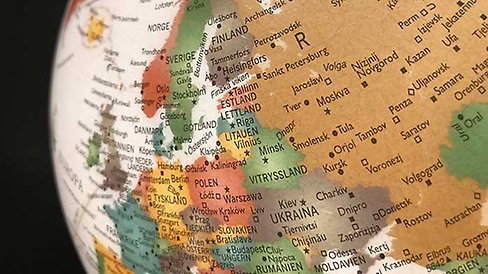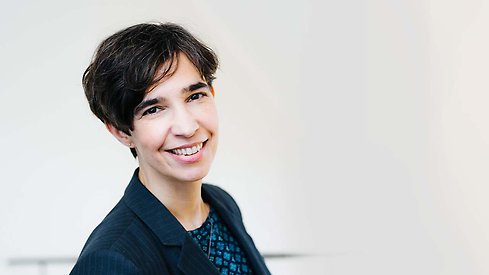Information as a tool – the internet and social media in times of war
We are able to follow Russia’s invasion of Ukraine minute by minute via social media and news channels. Is this the first time we are seeing a full-scale hybrid war in Europe, one where information and digital platforms have become weapons? And how are recent years’ rhetoric and polarisation in social media linked to the tragic events we see happening right now?

New pictures are published every day from the war in Ukraine, via established media and via people’s private accounts on Facebook and Instagram, but also via actors whose purpose is to spread disinformation. However, these digital platforms play an important role for the resistance, for rescue services och civil society.
Anne Kaun, professor in Media and Communication Studies, has studied trust in digital media, as well as digital activism.
“This is the first time we are seeing a social media war in Europe. We have seen it in other places in the world, not least in Syria and Afghanistan, but not in Europe. We can compare it with the Iraq war in 1991, which was described as a hi-tech war that came close to home via blurry television images,” she says.
Fast-moving newsfeeds
Something we have become accustomed to over the past few years is a rapid newsfeed and 24-hour updates, both on television and digitally. This fast-moving news reporting makes it difficult to differentiate between what is correct reporting and what is not. The established media have a great responsibility here, but we must also be very aware of our choice of news channels.
Facebook, Twitter, TikTok and other platforms are often criticised for being loudspeakers for disinformation, that their owners do not do enough to prevent the dissemination of lies. However, in her research into digital activism, Anne Kaun has also seen how the same channels help people to feel participatory, show solidarity and to organise.
“It is easy to feel helpless in times of conflict, but it is possible to show sympathy via Facebook, share the correct information and participate in fundraising. It can also be a portal to greater involvement and mobilisation,” she says.
Security policy and geopolitical perspectives
Associate professor Jonas Andersson Schwarz also conducts research in Media and Communication Studies, and has studied the media, digital infrastructure, how data is organised and various platforms. Examining the issue of social media and digital platforms from the perspectives of security policy and geopolitics, reveals that the information war we are witnessing today has been going on for years, at least since Russia annexed Crimea in 2014.
“What we are seeing are militarised information flows. Since 2014, Russia has further tightened its censorship laws and limited freedom of the press. Russian news channels such as Russia Today and Sputnik, a state-run Russian news service, have also become part of the alternative media in Sweden and other European countries. This docks into an international ideological movement that has developed and which aligns with Putin’s interests. But they are rarely representative of actual majorities,” he says.
This is a trend that can be seen as part of political developments, especially in Russia, but also in the US, which grows from kleptocratic interests, according to Andersson Schwarz. I.e., a state governed by people who use the opportunities provided by government for their own benefit.
“The interests of the oligarchs have eroded the Russian political system. We can also see this to some extent in the US and the UK,” he says.
Tougher rhetoric
Social media rhetoric has hardened in recent years, and the increasingly sharp tone also coming from Swedish accounts is not occurring in a vacuum. The most recent example highlighted by Andersson Schwarz is the false video from Prime Minister Magdalena Andersson’s press conference, which was spread by Moderate politicians. The video was of clips from the press conference that had been edited together to miscredit the government, without clearly stating it was manipulated.
“I feel this is extremely serious, spreading obviously fake films and using them for political point scoring. But it can also be picked up by political opponents and used against them. Some left sympathisers are also trying to make party-political points. This is a challenge, as we are in an election year in Sweden. On the other hand, perhaps campaigning will be less populist if the situation in Ukraine remains this serious, as it may lead to less tolerance among the audience when political influencers try to use cheap tricks,” he says.
Drastic measures
The EU has already introduced sanctions against Russia in an attempt to isolate the country from the rest of the world and stop the invasion. They have also talked about blocking Russian-controlled media from broadcasting in EU member states, and there are indications that hacker networks, such as Anonymous, are trying to shut down Russian websites.
“Withdrawing broadcasting rights is a drastic measure, and introducing strong economic sanctions of Russia has never been done before. Putin may see this as an escalation. On the other hand, Anonymous are an uncontrolled collective where insight is difficult. A few people claim to speak for the network, but they are free agents. However, we can see that the majority of them are hardly Putin supporters, and many of them spend their evenings trying to get websites off the internet. It is effective, but is perhaps most of all about ridiculing the regime.”
Page updated
04-03-2022





